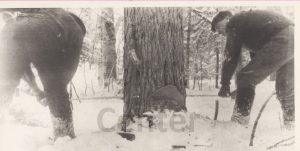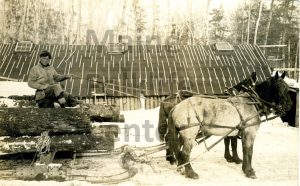Pittston Farm, “The Depot Camp”
Song: “The Depot Camp”
Singer: Bill Cramp
Town: Song about Pittston Farm area in western Maine; recorded in Oakland, ME
ID: NA 66.1 CD 102 Track 5
Collected by: Sandy Ives
Date: March 16, 1966
“The Depot Camp” was one of twenty songs included in the seventh volume of Northeast Folklore, “Folksongs from Maine.” The song, written by James O’Hara, a woodsman from Maine, described the lumbering operation owned and operated by James McNulty of Bangor, Maine. Composed in either 1901 or 1902, just a year or two before McNulty sold his operation to the Great Northern Paper Co., the song was reasonably well-known in Maine. McNulty’s camp was located on the North Branch (of the West Branch) of the Penobscot River, north and west of Pittston Farm. St. Zacharie and St. Côme, both listed as reference points in the song, are towns across the border in Quebec. Bill Cramp, who sang the “B” version given in “Folksongs from Maine” (also the version heard here), was in the camp and filled in many details for Sandy Ives and other researchers. The “A” and “B” versions printed in “Folksongs From Maine” exhibited certain differences – for instance, Cramp called the song “O’Hara’s Dream” and he handled the chorus differently – but the tunes were almost identical.

The song combined reality with fantasy as it described some of the logistics of running a logging camp, listed the members of the crew, and then developed a comedic interaction among the crew and St. Peter. Naming local people or members of a working crew was a common practice in songs about life in the woods and elsewhere, including “The Dungarvon Whooper,” “The Bull Moose Song,” “Canaday-I-O,” and many more. And it was often the case that this naming scheme made the song more popular and increased its longevity, at least locally. Available information about the men named in the song can be found below the lyrics. Two questions remain: what was a depot camp and who was James O’Hara? The depot camp was the central or base camp from which other camps in the operation were supplied. According to Bill Cramp, “[O’Hara] was just an old, rough, drunk woodsman, that’s all. Drunk from the time he went down out of the woods ‘til he went back.” But he was a good woodsman, and he made good songs – a list that also includes “McNulty’s Family,” a song about the same lumbercamp. The lyrics reprinted here include Cramp’s complete version of the song, though he only sang approximately half of the stanzas for this recording. The stanzas not heard in this version (three through nine) are contained in brackets; the chorus would also be sung at more regular intervals that Cramp did not follow in an effort to save his energy for the verses.
Lyrics:
1.
I dreamt last night of a depot camp
On the old Penobscot Stream,
It’s noted for its good men
And McNulty’s pork and beans;
It lies along an old tote road
Nearby the Canadian line,
‘Tis there you’ll see the toters tote
In hail, rain, and sunshine.
2.
They tote in all the flour and beans
Their grain and all the straw,
Our beef it comes from Bangor, Maine,
And some from Canada;
They take it to our good cook Lou,
Who cooks it in a pot,
And serves it on the table
When it is nice and hot.
Chorus:
There is stew, too, that it made by Lou,
It is made for me and you, too,
We’ll find it on the table
When our days work we get through, we do,
That’s stew, too, that is made by Lou,
It’s made for me and you,
He cooked it in a great large pot
For Jim McNulty’s crew.
3.
Now Alec and Bob has charge of the job
And they hustle out the logs,
While Luddy and Max with the cant dogs and ax
You’ll find them on the bog;
The teamsters they’re as jolly a crew as ever you did see,
There’s Stewart Hopkins and Tommy Lynch
And laughing Farmer McGee.
Chorus:
There’s stew, stew, etc.
4.
I had another dream last night,
I dreamt I said my prayers,
I dreamt I went to heaven,
Myself and Herbie Stairs;
And when we got up to the gate,
Saint Peter we did meet,
He said, “You jolly woodsmen
Can’t walk these golden streets.”
5.
Herbie says to Peter,
“Come, Pete, I know you well,
I hope you won’t get angry,
Goin’ to send us down to Hell.”
Peter says to Herbie,
“You go back and get your goods,
And when you leave the depot camp,
You bring up Howard Woods.”
Chorus:
And a pot of stew, too, etc.
6.
The two of us we started back
As happy as could be,
knew Howard would be delighted
If Saint Peter he could see;
But when we got back to the gate,
Saint Peter he had fled,
He peeked out through a little hole
And says, “I’ve gone to bed.
You records I have just looked up,
Of sins I find but five,
You must go back to the depot camp
And go out on the drive.”
7.
The three of us we started back
A-feelin’ mighty blue,
I look at Howard
And Howard at the stew;
Herbie took his scalin’ stick
And threw it at our feet,
He says, “That’s the very last time
I’ll ever speak to Pete.”
8.
We heard a shout, “Turn out! Turn out!”
A-comin’ along the road,
Was Alec and Bob with a load of logs
And the logs they were all gold;
And right behind was another team,
His driver was Jud Cramp,
He said, “Saint Peter sent the logs
To build McNulty’s camp.”
9.
Now when we go to the woods next fall
We’ll have a jolly time,
Our axes they’ll be made of gold,
Our cant dogs they will shine;
Our pickpoles they’ll be all gold, too,
Made of a golden rod,
And we’ll eat golden fishes there
Instead of rotten cod.]
10.
Now in my dream one year had passed,
I’d started out once more,
To see if we could find that camp
That’s built on the golden shore;
We went by the way of Canady,
Inquired of all we’d meet,
If they’d show us the way to the depot camp,
Was built by old Saint Pete.
11.
They shook their heads in silence
But one man said to me,
“You might get some information
To call on Saint Zacharie.”
We went up to Saint Zacharie,
But Zacharie wasn’t at home,
And then unto Saint Francis,
And they sent us to Saint Come;
That good man there was to guide us,
When the cookee, “Turn out!” screams,
We woke right up in the depot camp,
And found it all a dream.

The crew members named in the song covered the full array of jobs in lumbercamps:
- Alec MacLeod was walking boss (he was in charge of several camps)
- Bobby Lynch was the foreman of the camp
- Herby Stairs was a scaler (he measured the logs with his scaling rule or scaling stick)
- Howard Wood was the clerk
- Jud Cramp was Bill’s brother and a toter (the teamsters who hauled supplies in to the camps from the outside by way of the tote road)
- Louie April was, of course, the cook
- Luddy and Max were the landing men (they rolled the logs down with the cant dogs and put the owner’s mark on them with an ax)
- Tommy Lynch was the foreman’s brother
- McGee’s nickname was “The Old Farmer”
Source: Ives, Edward D., ed. “Folksongs from Maine,” Northeast Folklore VII (1965), 15-22. Also see the Fall 2010 Maine Folklife Center Newsletter for a version of this song sung by John Hafford of Allagash, ME.
